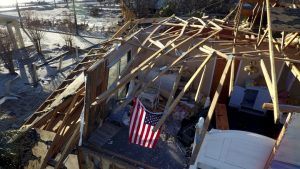Vann R. Newkirk II in The Atlantic:

The damage from hurricane michael is still being cataloged. After the Category 4 storm made landfall in the Florida Panhandle two weeks ago, it ripped through parts of Florida and Georgia, killing dozens and destroying homes and vital infrastructure in rural communities. Residents don’t yet have a full account of the lives and property erased in the calamity, and even when they do, that accounting will only provide a rough estimate of what was lost. More difficult still will be dealing with the intangibles: the exhaustion and mental-health consequences, the frayed sense of security and safety, the missed school days, and the deepening vulnerability among people who faced the storm.
As the country deals with an onslaught of powerful hurricanes and other weather-related events, those intangibles have become more evident, and more and more important. Michael is—according to experts I spoke with—both a harbinger of a future climate and a representative of a class of disasters that in the past few years have exposed the vulnerabilities of local and national institutions. Those disasters have highlighted the role of inequality, civic instability, and poor planning in amplifying the effects of both extreme and mundane weather. The evidence seems to be mounting that not only will the developing climate regime, if sustained, expose the cracks in the American democratic project, but it will also widen them.
More here.
